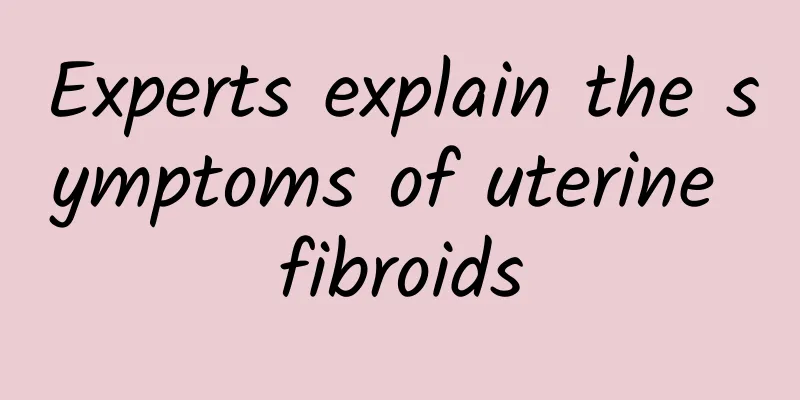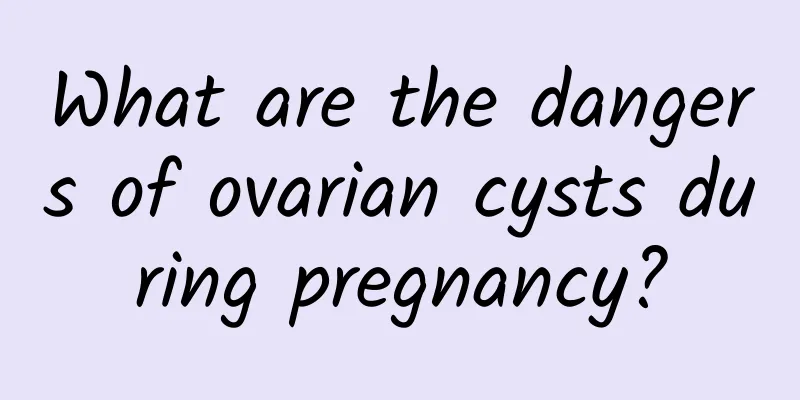Experts explain the symptoms of uterine fibroids

|
What are the symptoms of uterine fibroids? I believe this is a question that many female friends want to know. The key to treating uterine fibroids lies in the early detection of early symptoms of uterine fibroids. So, what are the symptoms of uterine fibroids? Let the experts introduce the symptoms of uterine fibroids in detail. Symptoms of uterine fibroids: 1. Abdominal pain: Ovarian tumor torsion, rupture or infection, uterine submucosal fibroids prolapse from the cervix or fibroid degeneration can all cause severe lower abdominal pain. 2. Abnormal vaginal discharge: Under normal circumstances, the secretions of the endometrium, endocervix and vaginal exudates form leucorrhea, which is generally not much and varies with the menstrual cycle. 3. Changes in diet and bowel movements: The initial symptoms of ovarian cancer may only be abdominal distension, poor appetite, and gastrointestinal symptoms. Tumor compression or invasion of the bladder and rectum can cause frequent urination, difficulty urinating, dry stools, etc. 4. Menstrual changes: When tumors grow in the uterus, such as uterine fibroids, endometrial cancer, uterine sarcoma, and choriocarcinoma, menstrual abnormalities may occur, including excessive menstrual flow, irregular menstrual cycles, prolonged menstrual duration, and spotting. Certain ovarian tumors, such as granulosa cell tumors and theca cell tumors, can secrete female hormones, interfere with the menstrual cycle, and cause menstrual abnormalities. For example, long-term heavy menstrual flow caused by fibroids can lead to secondary anemia, which in severe cases manifests as general fatigue, pale complexion, shortness of breath, and palpitations. 5. Tumors: They can grow in any part of the reproductive organs. Even if these tumors do not have any symptoms, they are abnormal phenomena and are mostly tumors. 6. Infertility: 25%-35% of patients with uterine fibroids may suffer from infertility because the fibroids hinder the fertilized egg from implanting or the fibroids prevent the sperm from entering the fallopian tube. The above are the symptoms of uterine fibroids. Through the expert’s introduction, I believe you have a certain understanding of the symptoms of uterine fibroids. If you still have any questions about the symptoms of uterine fibroids, please consult our online experts. For more information, please visit the uterine fibroid disease special topic at http://www..com.cn/fuke/zgjl/ or consult an expert for free. The expert will then give a detailed answer based on the patient's specific situation. |
<<: What causes uterine fibroids?
>>: How can patients with uterine fibroids recover after surgery?
Recommend
Wudou Shuanghong Decoction for the Treatment of Uterine Amenorrhea
The endometrium undergoes periodic changes due to...
What is the reason for bleeding after sex? 4 causes of bleeding after sex
There are four reasons for bleeding after interco...
Taking 18 doses of Chinese medicine to cure pelvic inflammatory disease
Ms. Liu is 44 years old and has had recurrent uri...
Experts help everyone understand the causes of ectopic pregnancy
Ectopic pregnancy is a female disease that is a b...
Can uterine cysts be eliminated by taking medicine? Will they recur?
Uterine cysts can be eliminated with medication i...
When women begin to age, there are generally 5 signs in the lower body! If you don't have any, it means you are still young
"Doctor, I feel like something is wrong with...
How much does uterine fibroid surgery cost?
The cost of uterine fibroid surgery is often a co...
What are the dangers of irregular menstruation?
It is very common for women to have irregular men...
Hysteroscopic abortion is a safe option
When it comes to abortion, the first thing that e...
Expert introduction: There are many misunderstandings in treating cervical erosion
What are the main misconceptions about cervical e...
How to treat uterine fibroids? How to use medication for uterine fibroids?
Uterine fibroids are the most common tumors of th...
What are the symptoms of enlarged uterine fibroids? What will happen if the uterine fibroids are enlarged?
What are the symptoms of enlarged uterine fibroid...
What medicine is best for women with irregular menstruation? Health care treatment for women with irregular menstruation
What medicine is best for irregular menstruation?...
Can’t get rid of excess fat? Have a glass of vinegar, ginger and lemon juice to promote blood circulation and lose weight faster!
Can’t lose body fat, catch a cold easily, and fee...
Experts explain how women can relieve dysmenorrhea
Dysmenorrhea has been bothering many women, causi...









